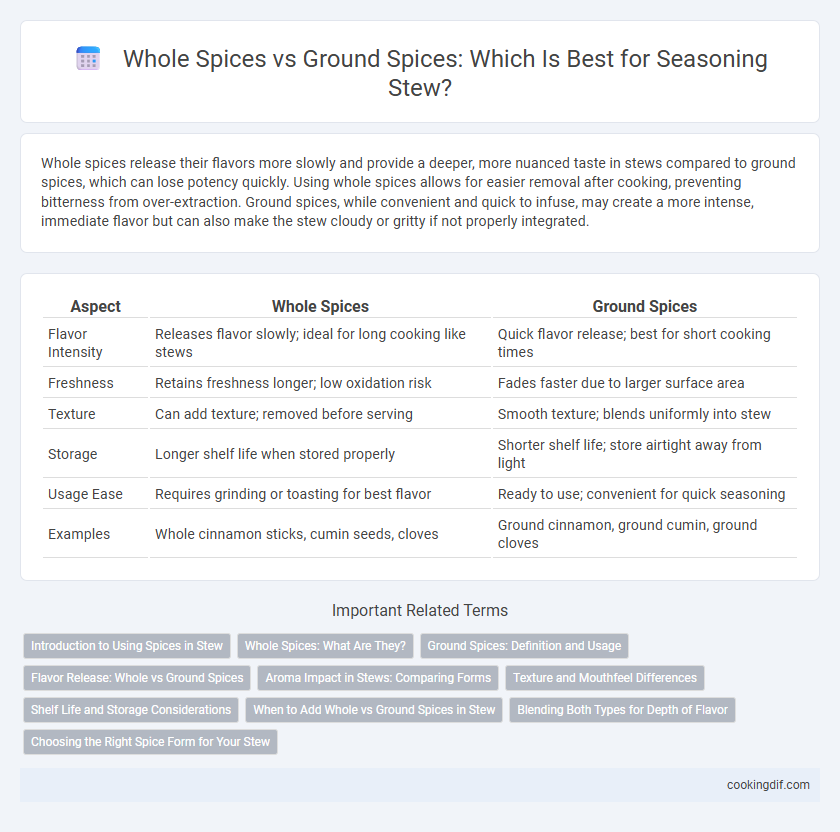Whole spices release their flavors more slowly and provide a deeper, more nuanced taste in stews compared to ground spices, which can lose potency quickly. Using whole spices allows for easier removal after cooking, preventing bitterness from over-extraction. Ground spices, while convenient and quick to infuse, may create a more intense, immediate flavor but can also make the stew cloudy or gritty if not properly integrated.
Table of Comparison
| Aspect | Whole Spices | Ground Spices |
|---|---|---|
| Flavor Intensity | Releases flavor slowly; ideal for long cooking like stews | Quick flavor release; best for short cooking times |
| Freshness | Retains freshness longer; low oxidation risk | Fades faster due to larger surface area |
| Texture | Can add texture; removed before serving | Smooth texture; blends uniformly into stew |
| Storage | Longer shelf life when stored properly | Shorter shelf life; store airtight away from light |
| Usage Ease | Requires grinding or toasting for best flavor | Ready to use; convenient for quick seasoning |
| Examples | Whole cinnamon sticks, cumin seeds, cloves | Ground cinnamon, ground cumin, ground cloves |
Introduction to Using Spices in Stew
Whole spices provide a deeper, more complex flavor to stews as their slow release during long cooking enhances the dish's aromatic profile. Ground spices offer convenience and quick infusion but can lose potency faster, making them ideal for shorter cooking times or finishing touches. Balancing whole and ground spices allows for layered seasoning and a richer stew experience.
Whole Spices: What Are They?
Whole spices are the seeds, bark, or pods of plants used in their natural form to season stews, offering a more intense and fresher flavor compared to ground spices. They retain essential oils longer, enhancing the depth and complexity of the dish during slow simmering. Common whole spices in stews include cinnamon sticks, cloves, cardamom pods, and peppercorns, which release their aroma gradually for a richer taste profile.
Ground Spices: Definition and Usage
Ground spices are finely milled versions of whole spices, offering a more intense and immediate flavor release ideal for seasoning stews. They blend seamlessly into liquids and sauces, ensuring even distribution without the need to remove solid pieces after cooking. Using ground spices enhances the depth and complexity of stews by infusing robust aromas quickly, making them essential for recipes requiring uniform seasoning.
Flavor Release: Whole vs Ground Spices
Whole spices release their flavors gradually during cooking, making them ideal for long-simmering stews where slow infusion enhances depth and complexity. Ground spices provide an immediate and more intense burst of flavor but can lose potency quickly and may become bitter if cooked too long. Using whole spices in stews ensures a balanced, layered taste profile that develops over time, while ground spices are better suited for finishing touches or quicker recipes.
Aroma Impact in Stews: Comparing Forms
Whole spices release aroma slowly during long stewing, enhancing depth and complexity through gradual infusion. Ground spices offer immediate and intense fragrance but may lose potency rapidly in extended cooking. Selecting whole spices preserves nuanced aroma layers, while ground forms deliver quick, concentrated seasoning bursts in stews.
Texture and Mouthfeel Differences
Whole spices in stew release flavors slowly, providing a more robust and layered taste with a coarser texture that enhances the mouthfeel through subtle bursts of spice. Ground spices blend quickly, offering an immediate, uniform flavor but can result in a powdery or gritty texture that may alter the stew's smoothness. Choosing whole spices improves stew complexity and texture, while ground spices prioritize speed and ease of seasoning.
Shelf Life and Storage Considerations
Whole spices offer a longer shelf life, typically retaining their flavor and potency for up to 4 years when stored in airtight containers away from heat and moisture. Ground spices, on the other hand, tend to lose their aroma and flavor more quickly, usually within 6 to 12 months, due to their increased surface area exposure to air. Proper storage in cool, dark places is essential for both forms to maintain optimal seasoning quality in stew preparation.
When to Add Whole vs Ground Spices in Stew
Whole spices release their flavors slowly and are best added early in the cooking process to infuse stews with deep, aromatic complexity. Ground spices deliver an immediate burst of flavor and are ideal for adding near the end of cooking to enhance taste without overpowering the dish. Balancing the timing of whole and ground spices ensures a well-rounded and richly seasoned stew.
Blending Both Types for Depth of Flavor
Whole spices retain their essential oils longer, providing a richer and more complex aroma when slow-cooked in stews. Ground spices release flavors quickly, making them ideal for immediate seasoning and finishing touches. Blending whole and ground spices enhances stew depth by combining slow-infused warmth with vibrant, freshly released notes.
Choosing the Right Spice Form for Your Stew
Whole spices release their flavors slowly, making them ideal for long-simmering stews where a deep, complex taste is desired. Ground spices dissolve quickly, providing immediate aroma and intensity but may lose potency over extended cooking. Selecting whole spices like cinnamon sticks or cardamom pods ensures gradual infusion, while ground spices like cumin or paprika add boldness at the final stages of seasoning.
Whole spices vs ground spices for seasoning Infographic

 cookingdif.com
cookingdif.com